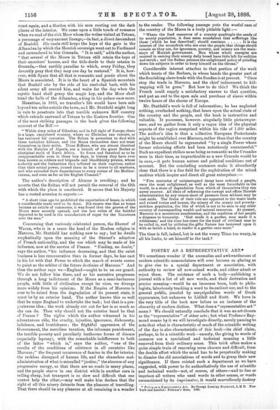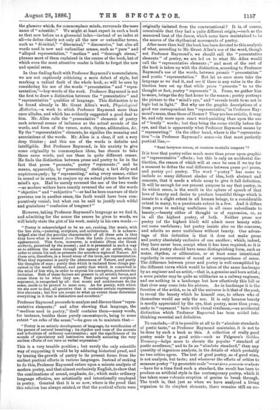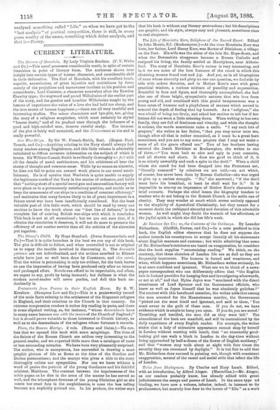POETRY AS A REPRESENTATIVE ART.*
WE sometimes wonder if the anomalies and awkwardnesses of modern scientific nomenclature will ever become so glaring as to give rise to a special department or association, with authority to review all new-coined words, and either admit or reject them. The existence of such a body—publishing a journal with a list of all new words, and their derivation and precise meaning—would be an immense boon, both to philo- logists, laboriously tracking a word to its earliest use, and to the general public, puzzled by sesquipedalian words of Greek appearance, but unknown to Liddell and Scott. We have in the very title of the book now before us an instance of the obscurity of modern diction. What does a" representative art" mean ? We should naturally conclude that it was an art chosen as the " representative " of other arts ; but what Professor Ray- mond means by it we will investigate directly, merely pausing to note that what is characteristic of much of the scientific writing of the day is also characteristic of this book—its chief claim, perhaps, to be a scientific work—namely, the giving to words of common use a specialised and technical meaning a little removed from their ordinary sense. This trick often makes a quite simple train of reasoning seem obscure and difficult, from the doable effort which the mind has to be perpetually making to dismiss the old associations of words and to grasp their new significance. If there existed such a department as we have suggested, with power to fix authoritatively the use of scientific and technical words—not, of course, of others—and to fine or imprison all writers who used words in other senses, or words unsanctioned by its imprimatur, it would marvelously destroy Poetry as a RTresentaGt a Art. By George LansIng Raymond, L K D. New York and London: Putnam's Sons, 1886.
the glamour which, for commonplace minds, surrounds the mere name of " scientific." We might at least expect in such a book as that now before us a glossarial index—instead of no index at all—to define clearly not only all the new or unfamiliar terms, sach as " di-initial," " diterminal," " discoursive," but also all words used in new and unfamiliar senses, such as " pure " and " alloyed representation," " median " and " thorough stress," phrases most of them explained in the course of the book, but of which even the most attentive reader is liable to forget the new and special sense.
In thus finding fault with Professor Raymond's nomenclature, we are not captiously criticising a mere defect of style, but marking a radical fault of the whole book, as will be seen by considering his use of the words " presentation " and "repre- sentation,"—key-words of the work. Professor Raymond is not the first to draw a distinction between the " presentative " and " representative " qualities of language. This distinction is to be found already in Mr. Grant Allen's work, Physiological .1sthetics,—a work to which Professor Raymond more than once alludes, and which has evidently suggested a good deal to him. Mr. Allen calls the " presentative " elements of poetry such external means of influence as the actual sounds of the
words, and form of the verses, metre, rhyme, alliteration, &c. By the " representative " elements, he signifies the meaning and associations of the words. Mr. Allen is a clear, if not a very deep thinker ; and this use of the words is definite and intelligible. But Professor Raymond, in his anxiety to give some originality to commonplace ideas, has chosen to take these same words, and use them in quite different senses.
He finds the distinction between prose and poetry to lie in the fact that prose " presents," poetry " represents ;" and he means, apparently, by "presenting," stating a fact drily and unpicturesquely ; by " representing," using every means, either in sound or in sense, to conjure up an actual picture before the mind's eye. Had he merely reversed the use of the two words —as modern writers have exactly reversed the use of the words "objective " and " subjective "—or had he been unaware of their previous use in another sense, the fault would have been com- paratively venial; but what can be said to justify such wilful and gratuitous " confusion of tongues ? "
However, taking Professor Raymond's language as we find it, and admitting for the nonce the senses he gives to words, we will briefly state the gist of his work, mainly in his own words :—
"Poetry is acknowledged to be an art, ranking, like music, with the fine arts,—painting, sculpture, and architecture. It is acknow- ledged also that the peculiar characteristio of all these arts is that they have what is termed form (from the Latin forma, an external appearance). This form, moreover, is aesthetic (from the Greek alo-OuTds, perceived by the senses) ; and it is presented in such a way as to address the senses through the agency of an artist, who, in order to attain his end, re-presents the sounds or sights of Nature. All these arts, therefore, in a broad sense of the term, are representative. What they represent is partly the phenomena of Nature, and partly the thoughts of man ; partly that which is imitated from things per- ceived in the world without, and partly that which is conceived in the mind of him who, in order to express his conception, produces the imitation. Both of these factors are present in all artistic forms, and cause them to be what they are. That painting and sculpture represent, is recognised by all : that music and architecture do the same, needs to be proved to most men. As for poetry, with which we are now to deal, all perceive that it contains certain representa- tive elements ; but few are aware to what an extent these determine everything in it that is distinctive and excellent."
Professor Raymond proceeds to analyse and discuss these "repre- sentative elements ;" and after showing that language, the "medium used in poetry," itself contains them—many words, for instance, besides those purely onomatopoeic, being to some extent "an echo of the sense,"—he goes on to maintain that-
" Poetry is an artistic development of language, its versification of the pauses of natural breathing ; its rhythm and tune of the accents and inflections of ordinary conversation ; and the significance of its sounds of ejaculatory and instinctive methods actuating the very earliest efforts of our race at verbal expression."
This is a very tenable position ; but surely the only scientific way of supporting it would be by adducing historical proof, and by tracing the growth of poetry to its present forms from the earliest poetical efforts in various languages. Instead of seeking to do this, Professor Raymond enters upon a minute analysis of modern poetry, and that almost exclusively English, to show that the combinations of sound, emphasis, &c, which make ordinary language effective, are artistically and intentionally employed in poetry. Granted that it is so now, where is the proof that this relation has always existed, or that the poetical effects were originally imitated from the conversational ? It is, of course, conceivable that they had a quite different origin,—such as the measured beat of the dance, which some have maintained to be the source of the rhythmical movements of poetry.
After more than half the book has been devoted to this analysis of what, according to Mr. Grant Allen's use of the word, though not Professor Raymond's, we should call the "presentative elements " of poetry, we are led on to what Mr. Allen would call the " representative elements ; " and most of the rest of the book is taken up with the distinction, according to Professor Raymond's use of the words, between prosaic " presentation " and poetic "representation." But let us once more take the language as we find it, and see if there is any value in the dis- tinction here set up that while prose " presents " to us the thought or fact, poetry " represents " it. Prose, we gather him to mean, brings the dry fact home to the reason ; poetry portrays the picture to the "mind's eye," and "reveals truth to us not in logic but in light." But why are the graphic descriptions of a good war correspondent less "representative," in Professor Ray- mond's sense, than those of Homer ? They are less artistic, it may be, and rely more upon exact word-painting than upon the use of "lonely " words ; but they bring the scene vividly before the eye, and that is apparently what Professor Raymond means by " representing." On the other hand, where is the "representa- tion "—in Professor Raymond's sense—in that most perfectly poetical line,—
" Sant lacrymm rerum, et mentem modelle tangnnt "?
It is true that poetry relies much more than prose upon graphic or " representative " effects ; but this is only an accidental dis- tinction, the reason of which will at once be seen if we try for a moment to define the real difference between prose qua prose, and poetry gad, poetry. The word " poetry " has come to include so many different shades of idea, both abstract and concrete, that it needs a whole essay to give it full definition. It will be enough for our present purpose to say that poetry, in its widest sense, is the result in the sphere of speech of that love of beauty and desire to produce beautiful things which is innate to a slight extent in all human beings, to a considerable extent in many, to a passionate extent in a few. And it differs from prose in making usefulness in all cases subordinate to beauty,—beauty either of thought or of expression, or, as in all the highest poetry, of both. Neither prose nor poetry (of the highest kind) will admit mere beauty with- out some usefulness ; but poetry insists also on the converse, and admits no mere usefulness without beauty. One advan- tage of this definition is that it does not make prose and poetry absolutely exclusive of one another ; which, indeed, they have never been, except when it has been required, as it is now, that poetry should have some distinguishing form, such as
metre, rhythm, or alliteration, or at least some intentional regularity in recurrence of sound or correspondence of sense.
The difference between prose and poetry is well exemplified by the different views which would be taken of the same landscape by an engineer and an artist,—that is, a genuine and born artist ; a mere painter may be quite as utilitarian as a railway engineer, and see nothing in a landscape but how effectively this hill or that river may come into his picture. As in landscape it is the function of the artist, so in all the universe is it that of the poet, to reveal the beauty which he himself sees, to others who of themselves would see only the use. It is only because beauty is mostly appreciated by the eye, that poetry, more than prose, seeks to " represent " facts with visual vividness,—an accidental distinction which Professor Raymond has been misled into thinking essential and definitive.
To conclude,—if it be possible at all to fix "absolute standards of poetic taste," as Professor Raymond maintains, it is not to be done by such a book as this. A collection of really good poetry made by a good critic—such as Palgrave's Golden Treasury—helps more to elevate the popular " standard of poetic excellence," and to fix an "absolute standard," than any quantity of ingenious analysis, in the details of which probably no two critics agree. The test of good poetry, as of good wine, is not analysis, but taste; and whenever the efforts of critics to measure poetry "by geometric scale "—reazirrq: icovorzt)v orcal.4 —have for a time fixed such a standard, the result has been to produce an artificial style in the contemporary poetry, which it has taken some volcanic eruption of genius to break through. The truth is, that just as when we have analysed a living organism to its simplest elements, there remains still an un- analysed -something called "Life," so when we have got to the "last analysis" of poetical composition, there is still, in every poem worthy of the name, something which defies analysis, and that is—Poetry.




































 Previous page
Previous page